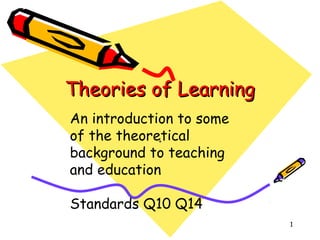Theories20of20learning 090916163756-phpapp02
- 1. Theories of Learning An introduction to some of the theoretical . background to teaching and education Standards Q10 Q14 1
- 2. What is Learning? ŌĆó Need to adopt a definition e.g. learning is the gaining of new knowledge / skills. ŌĆó Teaching an attempt to facilitate learning 2
- 3. Learning is being taught -Transmission model ŌĆó Very popular view and underlies much of National Curriculum. ŌĆó Behaviourist view. ŌĆó Sees learner as an empty vessel (or tabula rasa ŌĆōclean slate). 3
- 4. Behaviourist theories of learning ŌĆó Pavlov, Watson, Skinner ŌĆó observable behaviour not thinking and emotion ŌĆó Stimulus ŌćÆ response ŌćÆ reinforcement ŌćÆrepetition. ŌĆó Behaviour that is not reinforced is unlikely to be repeated ŌĆó http://uk.youtube.com/watch?v=I_ctJqjlr 4
- 5. Uses and Abuses of Behaviourism ŌĆó Programmed instruction ŌĆó But ŌĆō inflexible ŌĆó Does not describe the whole learning experience. ŌĆó Useful in lion taming! 5
- 6. Learning is about making sense. Constructivist ŌĆó The learner is not passive -constructs the sense and incorporates new knowledge into existing structure or adapts structure to accommodate new knowledge. http://uk.youtube.com/watch?v=F00R3pOX ŌĆó http://uk.youtube.com/watch? v=F00R3pOXzuk&feature=related 6
- 7. Constructivist Theories ŌĆó Not ŌĆ£modernŌĆØ e.g. Socrates 470-399 BC method of leading the learner on by questioning. And Plutarch AD 45 ŌĆ£The mind is not a vessel to be filled, but a vessel to be ignited.ŌĆØ ŌĆó Active view. Active learning also implies active experience, use of materials and role of play. ŌĆó The importance of play even for trainees http://uk.youtube.com/watch? v=K7vna8raRdc&feature=related 7
- 8. Constructivist View ŌĆó Associated with ideas of conception and misconception. ŌĆó Learners need to be able to stand back and reflect / review to be able to make sense of experienceŌĆō role of meta cognition ŌĆō thinking about thinking. ŌĆó Learners need to take charge of their own learning. Teacher is more ŌĆ£the guide on the sideŌĆØ than the ŌĆ£sage on the stageŌĆØ so the focus has to be on learning. 8
- 9. Jean Piaget Children do not think like adults. http://uk.youtube.com/watch? v=fcjPkPIwsog&feature=related ŌĆó Sensorimotor stage ŌĆó Preoperational stage ŌĆó Concrete operational stage ŌĆó Formal operational stage ŌĆó Now somewhat discreditedDevelopment leads learning v Learning leads to development 9
- 10. Examples from Piaget ŌĆó http://uk.youtube.com/watch? v=B65EJ6gMmA4&feature=related ŌĆó Conservation of volume ŌĆō which holds more water? http://www.youtube.com/watch? v=LpYQH_T2FWM&NR=1 10
- 11. Social constructivism Learning is socially mediated ŌĆó Learning is building knowledge as part of doing things with others ŌĆó Think of a time when someone has supported your learning. 11
- 12. Lev Vygotsky ŌĆó 1896 ŌĆō 1934 but work published much later. ŌĆó ZPD Zone of Proximal Development ŌĆó "What a child can do with assistance today she will be able to do by herself tomorrow" (Vygotsky 1978:p87). 12
- 13. Jerome Bruner Spiral Curriculum-We begin with the hypothesis that any subject can be taught effectively in some intellectually honest form to any child at any stage of development. ŌĆó Make the knowledge ready for the child rather than waiting for the child to be ready for the knowledge 13
- 14. Scaffolding ŌĆó How we support children's growing understanding ŌĆó Enactive - knowing how ŌĆó Iconic ŌĆó Symbolic learning 14
- 15. Knowing is a process not a product ŌĆó To instruct someone... is not a matter of getting him to commit results to mind. Rather, it is to teach him to participate in the process that makes possible the establishment of knowledge. We teach a subject not to produce little living libraries on that subject, but rather to get a student to think mathematically for himself, to consider matters as an historian does, to take part in the process of knowledge-getting. J.Bruner.. 15
- 16. Learning by doing ŌĆó I hear and I forget ŌĆó I see and I remember ŌĆó I do and I understand Attributed to Confucius ŌĆó http://www.youtube.com/watch? v=BnbmLHgQWqQ&feature=related What are the implications for lesson planning? 16
- 17. Evidence from Neuroscience -Cognitive Development ŌĆó Statistical learning (learning correlations e.g. baby can recognise own feet) ŌĆó Learning by imitation (e.g. Baby sticking out tongue) ŌĆó Learning through analogy ŌĆó Causal learning (explanation based learning) Are all present in rudimentary form from soon after birth 17
- 18. Implications ŌĆó cumulative learning is crucial ŌĆó Need to encounter the learning in varied contexts ŌĆó multi-sensory approaches ŌĆó ŌĆśnoviceŌĆÖ system that is very responsive to learning from errors followed by an ŌĆśexpertŌĆÖ system which is more entrenched in its learning ŌĆó motivation to learn and engagement of an emotional response 18
- 19. Memory Declaritive Memory ŌĆó memories that can be brought consciously and deliberately to mind (semantic and episodic memory) Implicit Memory ŌĆó knowledge that is usually indexed by changes in performance (for example riding a bicycle) 19
- 20. Do Teachers Help? ŌĆó Children (and adults) construct declarative memories, and therefore prior knowledge and personal interpretation affect what is remembered. ŌĆó Adapting our dialogue with young children leads to more organised and detailed learning and memory. 20
- 21. Metacognition ŌĆó Learning in classrooms can be enhanced by developing selfreflection and self regulation ŌĆó Recognising that you do not understand is prerequisite of asking for help 21
- 22. Implications From Goswami & Bryant ŌĆó Thinking, reasoning and understanding can be enhanced by imaginative or pretend play contexts. However, scaffolding by the teacher is required if these are to be effective. ŌĆó Individual differences in the ability to benefit from instruction (the zone of proximal development) and individual differences between children are large in the primary years, hence any class of children must be treated as individuals. 22
- 23. Report to Cambridge Primary Review ŌĆó Research Survey 2/1a: Children's Cognitive Development and Learning (Usha Goswami and Peter Bryant) Download from http://www.primaryreview.org.uk/Pub lications/Publicationshome.html 23
Editor's Notes
- <number><number>























